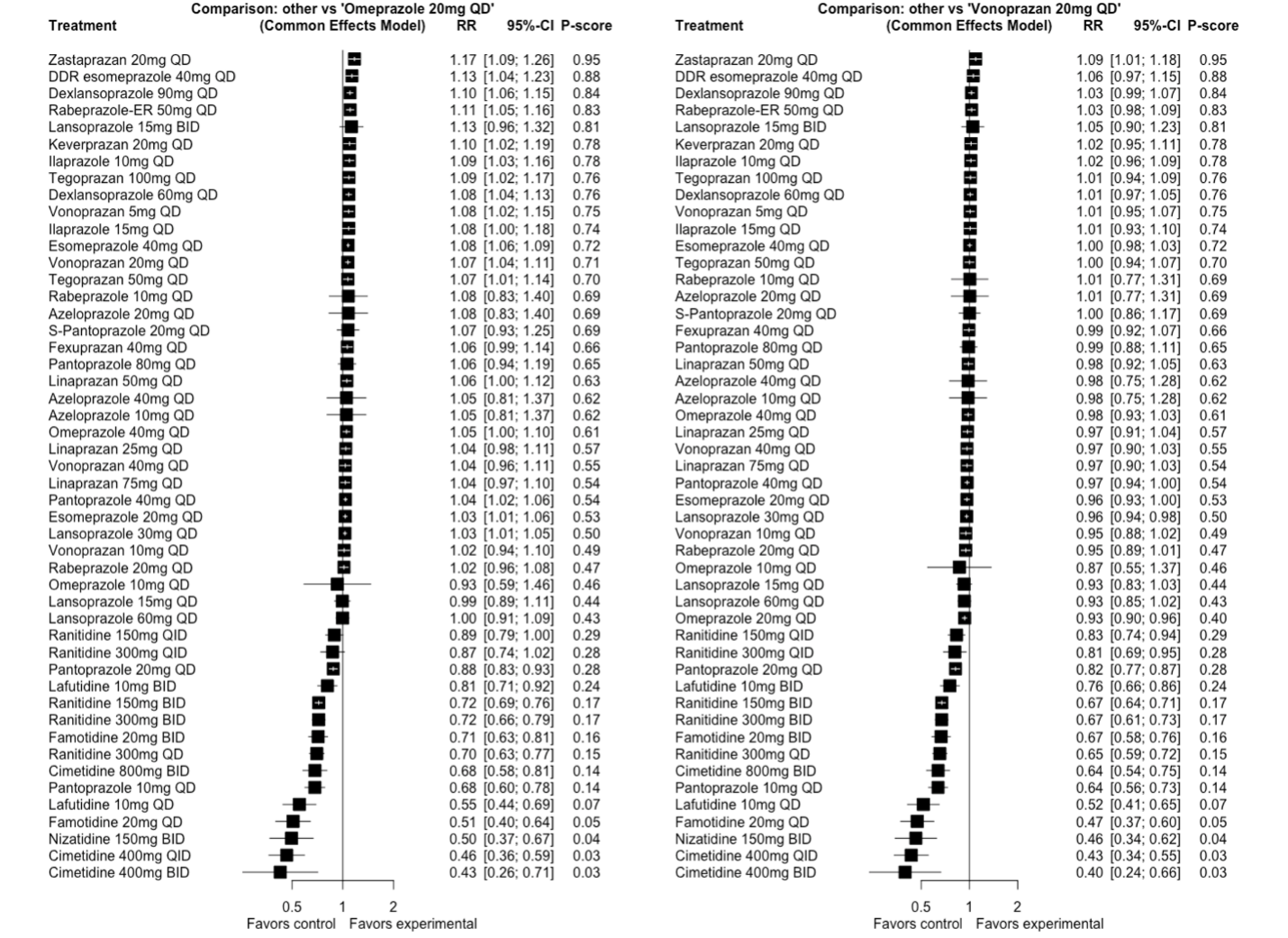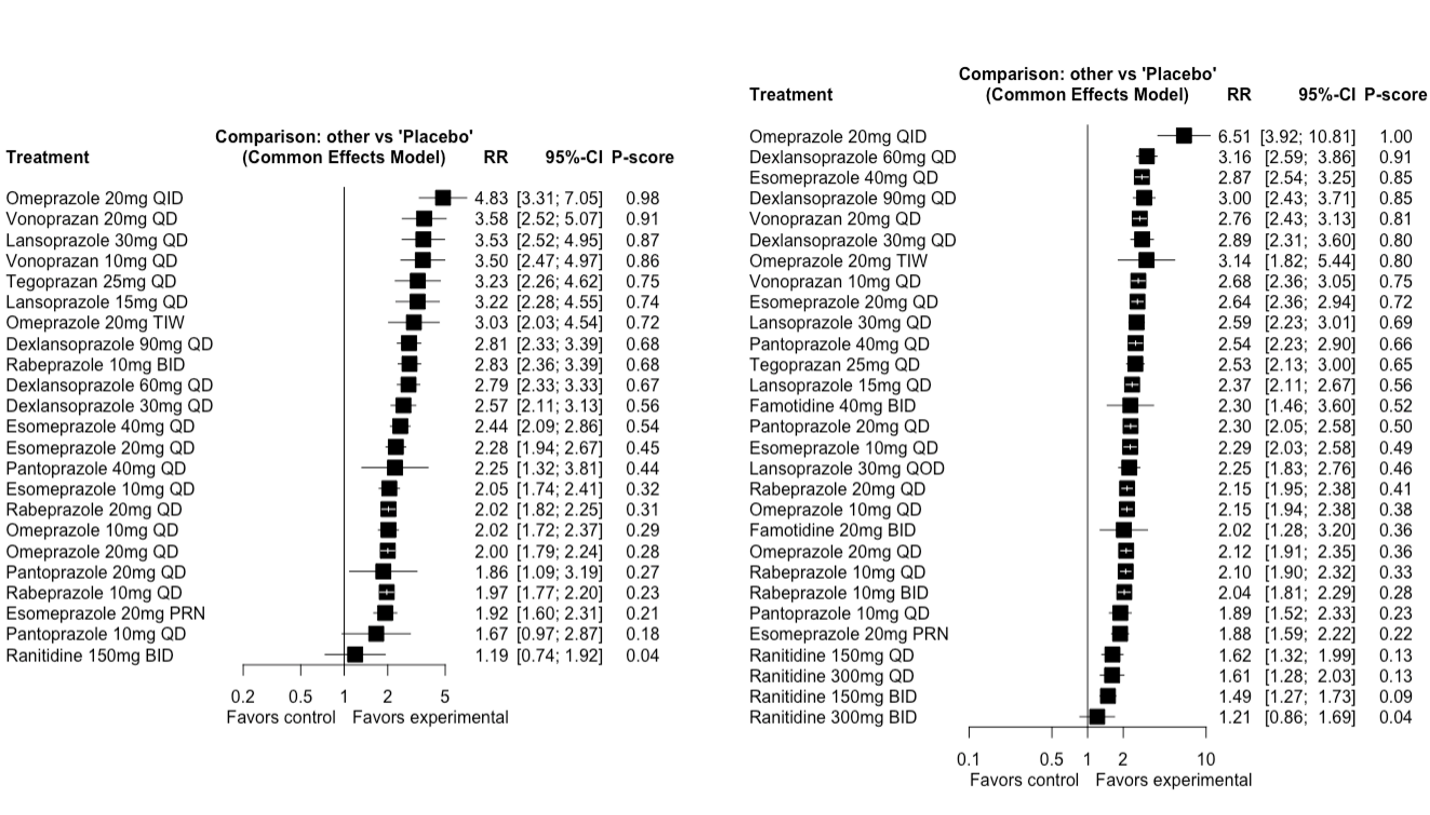Sunday Poster Session
Category: Esophagus
P0602 - Comparative Efficacy of Potassium-Competitive Acid Blockers, Proton Pump Inhibitors, and H2-Receptor Antagonists for Healing and Maintenance of Erosive Esophagitis: A Network Meta-Analysis of 164 Randomized Trials
Sunday, October 26, 2025
3:30 PM - 7:00 PM PDT
Location: Exhibit Hall

Daniel M. Simadibrata, MD
Case Western Reserve University / MetroHealth
Cleveland, OH
Presenting Author(s)
Daniel M. Simadibrata, MD1, Raul Jimenez, MD1, Thai Hau Koo, MD2, Ronnie Fass, MD, MACG3
1Case Western Reserve University / MetroHealth, Cleveland, OH; 2University of Sciences Malaysia Specialist Hospital, Kelantan, Kelantan, Malaysia; 3Division of Gastroenterology and Hepatology, Metrohealth Medical Center, Orange, OH
Introduction: Proton pump inhibitors (PPIs) transformed erosive esophagitis (EE) management in the 1990s, largely replacing histamine-2 receptor antagonists (H2RAs) as first-line therapy. Recently, potassium-competitive acid blockers (PCABs) emerged as a novel class of acid-suppression, offering more rapid and sustained acid inhibition, independent of food intake. Although few trials suggest superiority of vonoprazan, a PCAB, over standard-dose lansoprazole for EE healing, comparative data against high-dose or dual-delayed release PPI remain limited. This network meta-analysis aimed to rank the healing and maintenance of EE with acid suppressants including H2RA, PPI (standard, double, dual-delayed release doses), and PCAB.
Methods: Literature search was performed in MEDLINE, EMBASE, and the Cochrane Library from inception to February 2, 2025. Randomized controlled trials (RCTs) were included if they compared acid-suppressive agents (PCAB, PPI, H2RA) in adults with endoscopically confirmed EE or previously healed EE. Primary outcomes were cumulative healing rates of EE at week 8 and maintenance rates at 6 months. A frequentist network meta-analysis determined risk ratios (RR) with 95% confidence intervals (95%CI), using omeprazole 20mg QD and placebo as reference for healing and maintenance outcomes, respectively. Treatments were ranked by P-scores. Sensitivity analyses used vonoprazan 20mg and 10mg QD as alternate references for healing and maintenance.
Results: Overall, 164 RCTs evaluated healing (n=117), maintenance (n=44), and both (n=3). For EE healing at week 8, zastaprazan 20mg QD (RR 1.17; 95%CI 1.09-1.26; P-score=0.95), dual-delayed release esomeprazole 40mg QD (RR 1.13; 95%CI 1.04-1.23; P-score=0.88), and dexlansoprazole 90mg QD (RR 1.10; 95%CI 1.06-1.15; P-score=0.84) were most efficacious. H2RAs consistently ranked lowest. Compared to vonoprazan 20mg QD, only zastaprazan 20mg QD had significantly better healing.
For maintenance at 6 months, omeprazole 20mg QID (RR 6.51; 95%CI 3.92-10.81; P-score=1.00), dexlansoprazole 60mg QD (RR 3.16; 95%CI 2.59-3.86; P-score=0.91), and esomeprazole 40mg QD (RR 2.87; 95%CI 2.54-3.25; P-score=0.85) were most effective. At 3 months, omeprazole 20mg QID, vonoprazan 20mg QD, and lansoprazole 30mg QD were top-performing regimens.
Discussion: Zastaprazan 20mg QD was most effective agent for EE healing, whereas omeprazole 20mg QID best prevents recurrence. Overall, PCABs like vonoprazan do not consistently outperform dual-delayed release or double-dose PPI.

Figure: Figure 1. Relative rankings of acid-suppressive agents for healing of erosive esophagitis at week 8, referenced to (A) omeprazole 20mg once daily and (B) vonoprazan 20mg once daily.

Figure: Figure 2. Relative rankings of acid-suppressive agents for recurrence prevention of erosive esophagitis at (A) 3 months and (B) 6 months.
Disclosures:
Daniel Simadibrata indicated no relevant financial relationships.
Raul Jimenez indicated no relevant financial relationships.
Thai Hau Koo indicated no relevant financial relationships.
Ronnie Fass: BrainTree Labs/Sebela – Consultant. Carnot – Speaker. Daewoong – Consultant, Speaker. dexcal – Consultant. Megalab – Speaker. Phathom Pharmaceuticals – Advisory Committee/Board Member, Consultant.
Daniel M. Simadibrata, MD1, Raul Jimenez, MD1, Thai Hau Koo, MD2, Ronnie Fass, MD, MACG3. P0602 - Comparative Efficacy of Potassium-Competitive Acid Blockers, Proton Pump Inhibitors, and H2-Receptor Antagonists for Healing and Maintenance of Erosive Esophagitis: A Network Meta-Analysis of 164 Randomized Trials, ACG 2025 Annual Scientific Meeting Abstracts. Phoenix, AZ: American College of Gastroenterology.
1Case Western Reserve University / MetroHealth, Cleveland, OH; 2University of Sciences Malaysia Specialist Hospital, Kelantan, Kelantan, Malaysia; 3Division of Gastroenterology and Hepatology, Metrohealth Medical Center, Orange, OH
Introduction: Proton pump inhibitors (PPIs) transformed erosive esophagitis (EE) management in the 1990s, largely replacing histamine-2 receptor antagonists (H2RAs) as first-line therapy. Recently, potassium-competitive acid blockers (PCABs) emerged as a novel class of acid-suppression, offering more rapid and sustained acid inhibition, independent of food intake. Although few trials suggest superiority of vonoprazan, a PCAB, over standard-dose lansoprazole for EE healing, comparative data against high-dose or dual-delayed release PPI remain limited. This network meta-analysis aimed to rank the healing and maintenance of EE with acid suppressants including H2RA, PPI (standard, double, dual-delayed release doses), and PCAB.
Methods: Literature search was performed in MEDLINE, EMBASE, and the Cochrane Library from inception to February 2, 2025. Randomized controlled trials (RCTs) were included if they compared acid-suppressive agents (PCAB, PPI, H2RA) in adults with endoscopically confirmed EE or previously healed EE. Primary outcomes were cumulative healing rates of EE at week 8 and maintenance rates at 6 months. A frequentist network meta-analysis determined risk ratios (RR) with 95% confidence intervals (95%CI), using omeprazole 20mg QD and placebo as reference for healing and maintenance outcomes, respectively. Treatments were ranked by P-scores. Sensitivity analyses used vonoprazan 20mg and 10mg QD as alternate references for healing and maintenance.
Results: Overall, 164 RCTs evaluated healing (n=117), maintenance (n=44), and both (n=3). For EE healing at week 8, zastaprazan 20mg QD (RR 1.17; 95%CI 1.09-1.26; P-score=0.95), dual-delayed release esomeprazole 40mg QD (RR 1.13; 95%CI 1.04-1.23; P-score=0.88), and dexlansoprazole 90mg QD (RR 1.10; 95%CI 1.06-1.15; P-score=0.84) were most efficacious. H2RAs consistently ranked lowest. Compared to vonoprazan 20mg QD, only zastaprazan 20mg QD had significantly better healing.
For maintenance at 6 months, omeprazole 20mg QID (RR 6.51; 95%CI 3.92-10.81; P-score=1.00), dexlansoprazole 60mg QD (RR 3.16; 95%CI 2.59-3.86; P-score=0.91), and esomeprazole 40mg QD (RR 2.87; 95%CI 2.54-3.25; P-score=0.85) were most effective. At 3 months, omeprazole 20mg QID, vonoprazan 20mg QD, and lansoprazole 30mg QD were top-performing regimens.
Discussion: Zastaprazan 20mg QD was most effective agent for EE healing, whereas omeprazole 20mg QID best prevents recurrence. Overall, PCABs like vonoprazan do not consistently outperform dual-delayed release or double-dose PPI.

Figure: Figure 1. Relative rankings of acid-suppressive agents for healing of erosive esophagitis at week 8, referenced to (A) omeprazole 20mg once daily and (B) vonoprazan 20mg once daily.

Figure: Figure 2. Relative rankings of acid-suppressive agents for recurrence prevention of erosive esophagitis at (A) 3 months and (B) 6 months.
Disclosures:
Daniel Simadibrata indicated no relevant financial relationships.
Raul Jimenez indicated no relevant financial relationships.
Thai Hau Koo indicated no relevant financial relationships.
Ronnie Fass: BrainTree Labs/Sebela – Consultant. Carnot – Speaker. Daewoong – Consultant, Speaker. dexcal – Consultant. Megalab – Speaker. Phathom Pharmaceuticals – Advisory Committee/Board Member, Consultant.
Daniel M. Simadibrata, MD1, Raul Jimenez, MD1, Thai Hau Koo, MD2, Ronnie Fass, MD, MACG3. P0602 - Comparative Efficacy of Potassium-Competitive Acid Blockers, Proton Pump Inhibitors, and H2-Receptor Antagonists for Healing and Maintenance of Erosive Esophagitis: A Network Meta-Analysis of 164 Randomized Trials, ACG 2025 Annual Scientific Meeting Abstracts. Phoenix, AZ: American College of Gastroenterology.
